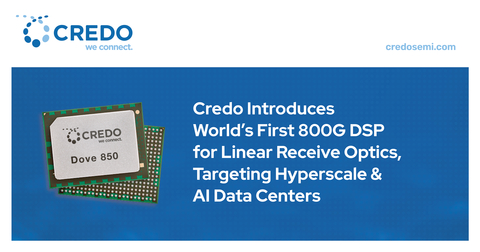Optimized DSP Reduces Module Power and Cost, Enabling Robust System Performance
Credo Technology Group Holding Ltd (NASDAQ: CRDO) today announced availability of an industry first, the Dove 850 800G Digital Signal Processor (DSP) IC, optimized for Linear Receive Optics (LRO), also known within the industry as Half-retimed Linear Optics (HALO). In an LRO transceiver or Active Optical Cable (AOC), only the transmit path from the electrical input to the optical line side output includes a DSP for signal retiming and equalization. The Dove 850 is a unidirectional 8 x 112 Gb/s DSP purpose built for this LRO architecture.
This press release features multimedia. View the full release here: https://www.businesswire.com/news/home/20231129341796/en/

Credo today announced availability of an industry first, the Dove 850 800G DSP IC, optimized for Linear Receive Optics (LRO), also known within the industry as Half-retimed Linear Optics (HALO). In an LRO transceiver or Active Optical Cable (AOC), only the transmit path from the electrical input to the optical line side output includes a DSP for signal retiming and equalization. The Dove 850 is a unidirectional 8 x 112 Gb/s DSP purpose built for this LRO architecture. (Graphic: Business Wire)
As hyperscale data center AI deployments grow rapidly, high-speed optical transceivers and AOCs are critical to connecting thousands of GPUs. Given the huge volume of these optical components, improvements in energy efficiency are essential. The Dove 850 addresses this need while enabling robust system performance, with the added benefit of reducing cost.
“Dove 850 reduces DSP power by up to 50% and optimizes cost while providing customers with an easy to use, robust, and interoperable solution,” said Chris Collins, Vice President of Sales and Optical Product Marketing at Credo. “Our lead transceiver and hyperscale customers recognize the value of this solution and we have already shipped Dove 850 samples and evaluation boards to address the market need.”
Transceiver vendors can further optimize the module cost with Dove 850 by employing a variety of optics, including VCSELs, silicon photonics, EML or thin-film lithium niobate as dictated by the application requirements.
A Dove 850 based optical transceiver aims to address the inherent weakness of a Linear Pluggable Optics (LPO) implementation by facilitating IEEE compliant optical transmit signaling and easing the deployment burden on system operators by eliminating manual, per port tuning. The result is lower bit error rates, enhanced sensitivity, reduced performance variation, and improved resilience to different switch ASICs, PCB traces, optical components, and environmental conditions.
“Over the last year, LPO has been a popular topic as the industry looks for ways to reduce power consumption in datacenters. However, customer enthusiasm has been curbed because of technical limitations such as interoperability, link accountability, and the ability to troubleshoot, which drove our forecast for LPO to less than 10% of the 800GbE market,” said Scott Wilkinson, Lead Analyst for Optical Components at Cignal AI. “Credo’s Dove 850 is a half-retimed solution that addresses these limitations, consumes less power than conventional optics, and provides a clear path to 224G for 1.6 Tb/s operation. This solution should significantly expand the market for low power 800GbE solutions well beyond that of LPO.”
The Dove 850 features independent PLL’s for each lane to support breakout applications, an OIF CEI-112G-MR compliant host interface, and numerous integrated diagnostic features to accelerate time to market and aid with system debug.
Dove 850 Features and Technical Benefits
- IEEE 802.3 and CMIS 5.x compliant.
- 8 x 112 Gb/s PAM4 on both the electrical host receiver and optical line transmitter interfaces.
- Copper optimized DSP based electrical host side receivers deliver industry leading sensitivity and BER performance.
- Line side transmitters with multi-tap FIR filters, and non-linear correction facilitate the use of multi-mode or single-mode optics.
- Independent phase locked loops per channel supports flexible breakout configurations including 2x400G, 4x200G and 8x100G.
- A full suite of link diagnostic features simplifies lab bring up and production testing.
- Low-power dissipation reduces cooling requirements and provides for an energy efficient 800G optical solution.
Availability
Samples and evaluation boards of the Dove 850 are available immediately. Interested customers should contact: sales@credosemi.com. All Credo product offerings are supported by evaluation boards, simulation models, characterization reports, reliability reports, design libraries and a complete set of supporting documentations.
To learn more about Credo Optical products, go here.
About Credo
Our mission is to deliver high-speed solutions to break bandwidth barriers on every wired connection in the data infrastructure market. Credo is an innovator in providing secure, high-speed connectivity solutions that deliver improved power efficiency as data rates and corresponding bandwidth requirements increase exponentially throughout the data infrastructure market. Our innovations ease system bandwidth bottlenecks while simultaneously improving on power, security, and reliability. Our connectivity solutions are optimized for optical and electrical Ethernet applications, including the emerging 100G (or Gigabits per second), 200G, 400G, 800G and the emerging 1.6T (or Terabits per second) port markets. Credo products are based on our proprietary Serializer/Deserializer (SerDes) and Digital Signal Processor (DSP) technologies. Our product families include Integrated Circuits (ICs) for the optical and line card markets, Active Electrical Cables (AECs) and SerDes Chiplets. Our intellectual property (IP) solutions consist primarily of SerDes IP licensing.
For more information, please visit https://www.credosemi.com. Follow Credo on LinkedIn.
View source version on businesswire.com: https://www.businesswire.com/news/home/20231129341796/en/
Contacts
Media Contact:
Diane Vanasse
diane.vanasse@credosemi.com
Investor Contact:
Dan O’Neil
dan.oneil@credosemi.com

